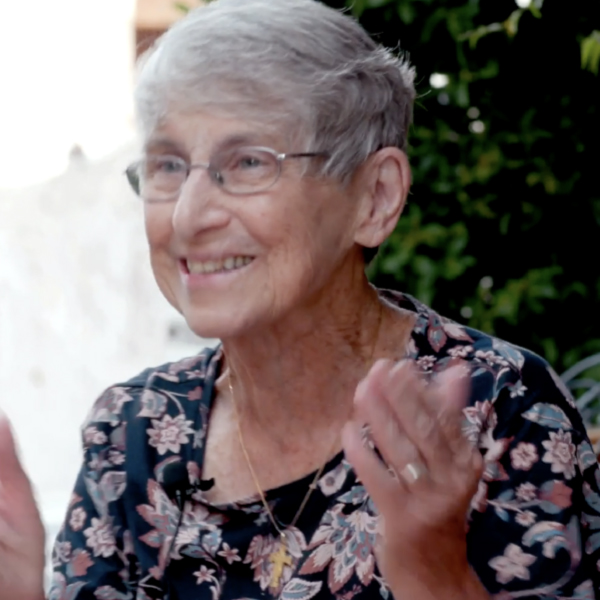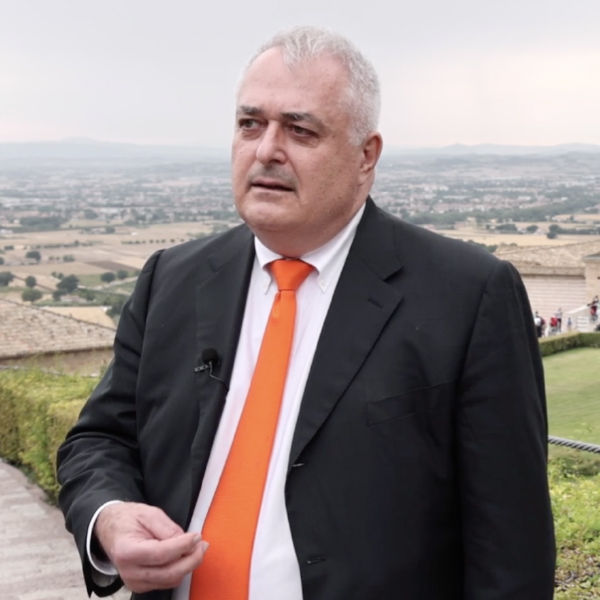Interview with H.E. Roberto Manuel Carlés on Laudato si’ and the Foundation
Full Interview
00:55 Steve: Roberto, for those people who have not read Laudato si’, how would you explain the challenges that Pope Francis has laid out for us?
01:09 Roberto: Well, I think the most important thing is to understand that this is not merely an environmental circular. It’s not a typical, traditional green discourse. What Pope Francis proposes in this circular, and this is the main challenge we face as the human race, is a wholistic ecology. It’s the idea, which he clearly sets forth in the circular, that caring for the environment cannot be separated from caring for people. That’s the idea of a wholistic ecology, a humane ecology. And this poses many challenges, mainly the two greatest issues humanity faces today are inequality and climate change, which cannot be addressed separately. We must understand and acknowledge that these are part of the same problem and act accordingly. And these actions must be both individual and collective. And I believe this is the main difference with other ecologisms which… are currently in fashion or disseminated.
02:08 Steve: That’s interesting. But how would you say that Laudato si’ and the challenges that Pope Francis has laid out is rooted in Catholic tradition?
02:20 Roberto: I believe the first thing we must remember is why he chose the name of Francis. And he always tells the story that, at the time of the conclave, when he realized he had been chosen Pope, a Brazilian Cardinal, Cardinal Hummes, said to him, asked him to not forget the poor. And at that moment, he decided to choose the name of Francis. I believe that is the main connection, the… the idea of a Church, as he promotes it, that is close to the poor, close to the periphery, the periphery in a material and existential sense, that is, those who are often in the margins. I believe that is the main connection we can make between his papacy and the figure of Saint Francis. Of course, in regard to the circular specifically, the connection is evident. The Pope uses, has named the circular, and, in addition, he quotes a very well-known Saint Francis prayer that is a praise of God, thanking him for the gifts of nature. Right? And I believe that this should make us think today, in the 21st century, that, just as Saint Francis considered animals and natural elements not as resources, as they are considered today, but as brothers and sisters, this must also make us think about the rights and the way we must protect these resources, as we call them, which are really gifts. They are assets which belong to us all. And they are the legacy of the entire human race. I believe this is the main connection that… that we can make today.
04:08 Steve: So, Roberto, Laudato si’ is only the second encyclical in history to be addressed to all people of good will. How are we to think about this and implement this with as open arms as I believe Pope Francis envisions?
04:29 Roberto: Well, the challenge posed by climate change and the environmental, social, economic and spiritual crisis that our planet is facing necessarily requires a far-reaching conversation, a dialogue that includes and summons, addresses us all, beyond our different creeds, ethnicities, without … without any type of political sense of belonging or ideology. And the Pope is very clear about this. He is so clear that, in the circular, without a doubt, one of his main inspirations and sources is found in the texts and the work done by the patriarch, Bartolomé I, right? He is one of his main sources of inspiration. The Pope, well before he became Francis, always advocated and defended interreligious dialogue. I believe this is an absolute precondition for the work we have ahead of us. But, without a doubt, the challenges posed by this environmental crisis require the dialogue to include everyone.
05:30 Steve: So, Pope Francis’s vision, as expressed in Laudato si’ speaks to both actions — how we should think about it both individually and communally. How do you think this translates into what the foundation does?
05:46 Roberto: Well, if we consider the main challenges we face, especially in regard to the environment, beginning with climate change, but also including the pollution of the air, the soils and water, we find that clearly there is a type of ecology that promotes a strictly individual responsibility, that is, it promotes actions we must implement as persons, individuals, right? And there are others, other sectors, which promote a more collective approach and especially a sense of corporate or governmental responsibility. These two approaches are not exclusive, and I believe this is what the Pope is proposing in his message. There are things we must do as individuals, as regards our manner of consumption, the way we relate with our environment, which we must necessarily change. But there are also responsibilities that are collective, which, regardless of our good will individually, cannot be changed by single persons. And, in this sense, it is very important for Nations to assume their responsibilities, especially in the forums, such as the COP, to establish a definitive agreement and apply it, for example, for the reduction of greenhouse gases and the fulfillment of our commitments, at least the ones set forth in the Paris Agreement, in regard to the temperature rise as compared to preindustrial times. These commitments are governmental in nature, collective and international, and we also have individual commitments. Both are necessary. This is a change that must be propelled by our global leaders, be it politicians, or… or corporations, from the field of labor, academia, uh, but it must also be propelled by individuals, by changing their manner of consumption, the way they relate to the world.
07:48 Steve: And in that light, Pope Francis does discuss the impact of the rapid changes in technology. What do you think that means?
07:59 Roberto: Well, this is concern for, not so much for technological advancement, which is not a subject of concern, but rather for Technicism, right? It’s a concern for an excessive focus on technology, which had already been expressed by some thinkers and philosophers of the early 20th century, which probably reached its highest point after the Second World War, right? Here, technological progress also showed us how far man could go with his potential for self-destruction. I believe Francisco’s main concern in this sense is about technology ceasing to be a means to attain the common good and becoming the end in itself. And this is dangerous, because, when technology and progress become an end in themselves or a means for the accumulation of riches, of power, without considering or caring about the common good, this really is… a problem, and it’s something that, that, well, requires our constant reflection.
09:09 Steve: Well, the challenges are clearly huge for the Foundation. Where do you think it can take action to start?
09:18 Roberto: Well, I believe our first mission must be, and we have even discussed this with Pope Francis, to disseminate his message and preserve this legacy. And we currently have a fundamental task, and that is to encourage reflection on subjects such as the ones mentioned here, right? This is the first step, to encourage reflection. And, after that, we must start to plan concrete actions connected, as we said, to our individual and collective responsibilities. That is why we must do everything we can to ask our leaders to acknowledge the commitments they must assume, but also to promote individual action and, within these individual actions, concrete actions that change the lives of people. I believe we have a great challenge ahead of us. If we review, if we evaluate the results we have had at a global level in the climate field, well, everything seems to indicate that our awareness is not yet sufficient, and we have a lot of work to do in this sense.



